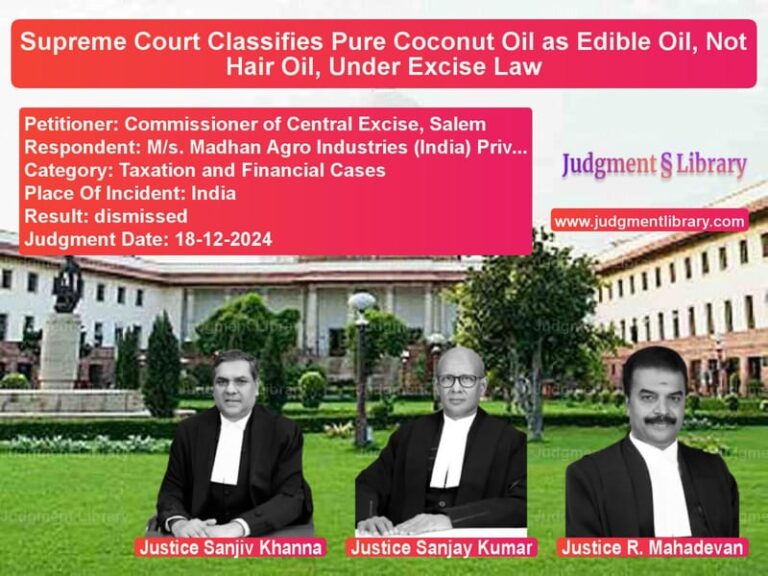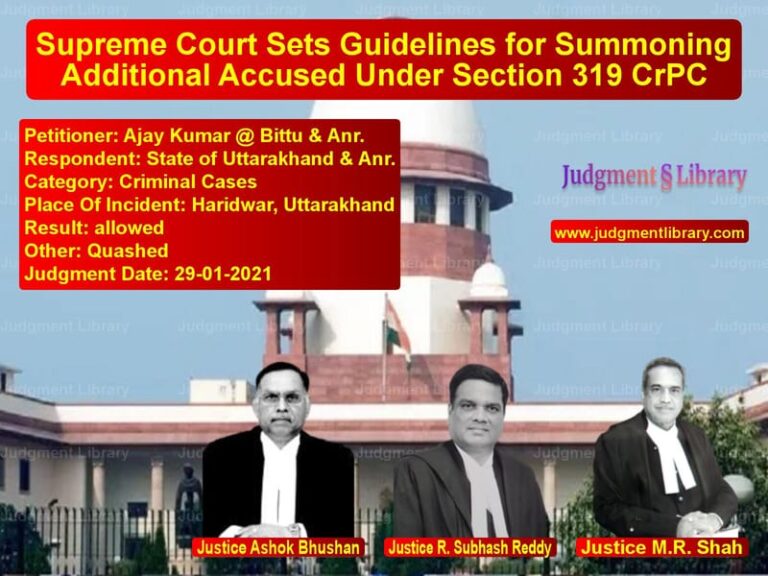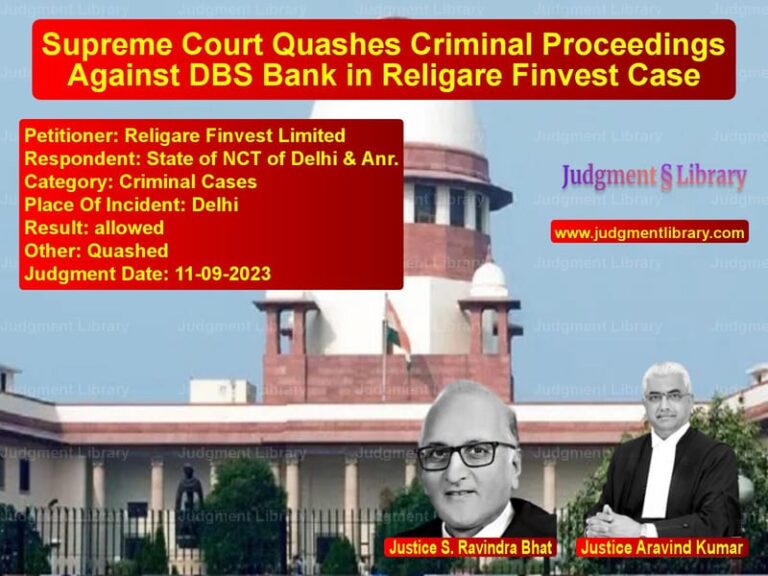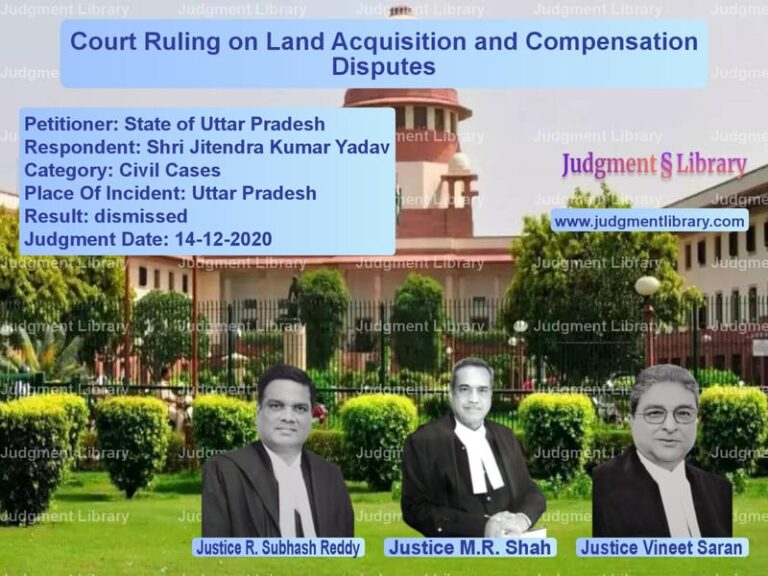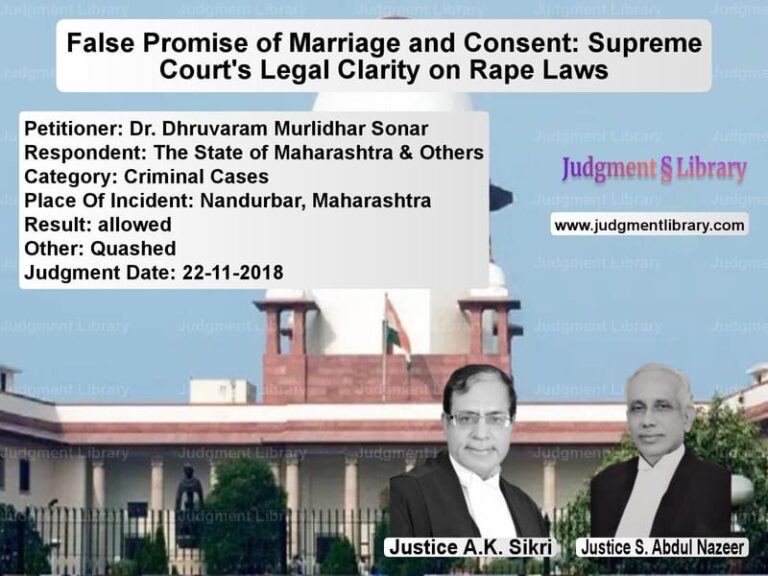Supreme Court Judgment on PIL Misuse in Election Disputes in Worker Unions
The Supreme Court of India, in its judgment delivered on 30th July 2019, addressed a significant issue regarding the use of Public Interest Litigation (PIL) to challenge election results in worker unions, specifically in the case of the Kopargaon Taluka Sakhar Kamgar Sabha (the Sabha). The Court examined the petitioner’s arguments against the electoral process imposed by the Election Officer of the Sabha. The Court ultimately dismissed the PIL, reinforcing the boundaries within which PILs can be filed and emphasizing that PILs cannot be used to challenge decisions that have already been adjudicated by appropriate authorities in established legal processes.
Background of the Case
The petitioners, led by Karbhari, challenged the election process under which the Managing Committee and the General Council of the Sabha were constituted. The petitioners alleged that the election procedure imposed by the Election Officer, particularly the unit-wise reservation system and the proportional representation of the Sabha’s members, was illegal. According to the petitioners, the Election Officer had introduced changes to the Sabha’s Constitution that violated its original provisions.
The election process had been supervised by the Election Officer, who introduced unit-wise reservations, allocating a certain number of seats for each unit within the Sabha. The petitioners contended that these reservations were arbitrary and not in line with the Sabha’s original Constitution.
The respondents, including the Election Officer, argued that the changes made by the Election Officer were in accordance with the law and that they served to ensure fair and equitable representation across the Sabha’s diverse units. The respondents maintained that the election process was transparent and followed the due legal process, and thus, there was no merit in the petitioners’ claims.
Petitioner’s Arguments
- The Election Officer’s unit-wise reservation system violated the Sabha’s Constitution and was implemented without proper consultation with the union members.
- The changes made by the Election Officer altered the representation mechanism of the Sabha, resulting in unfair elections.
- The High Court erred in dismissing their petition and allowing an election procedure that was inconsistent with the original rules.
The petitioners argued that the reservation system imposed by the Election Officer was unconstitutional and did not align with the provisions set out in the Sabha’s governing documents. The petitioners also challenged the legality of the process that resulted in the election of members to the Managing Committee and the General Council under the newly introduced rules.
Respondent’s Arguments
- The changes made by the Election Officer were necessary to ensure fair and balanced representation of all units within the Sabha.
- The PIL was filed without proper legal grounds, as all available remedies had been exhausted through the legal channels.
- The High Court’s decision to dismiss the petition was correct, as the election procedure did not violate the law.
The respondents argued that the Election Officer’s decisions were well within their rights to introduce changes for the sake of fairness and that these changes had been implemented to address existing inequalities in the Sabha’s representation system. They further asserted that the election process followed the prescribed procedures and was in line with the legal framework governing union elections.
Court’s Final Decision
The Supreme Court dismissed the PIL, upholding the election process imposed by the Election Officer. The Court made the following remarks:
“The introduction of unit-wise reservations was not an illegal alteration of the Sabha’s Constitution, but rather a necessary measure to ensure fair representation across the Sabha’s diverse units.”
The Court emphasized that the changes made by the Election Officer were reasonable and aimed at promoting fairness within the Sabha’s structure. The decision reinforced that PILs cannot be used as a means to reopen decisions that have already been adequately addressed by the relevant legal authorities.
Key Takeaways from the Judgment
- PILs cannot be used to challenge electoral decisions that have been made through proper legal procedures.
- The introduction of unit-wise reservations in worker union elections was deemed to be a reasonable and lawful decision by the Election Officer.
- The Court stressed that PILs should not be used to challenge internal governance processes of unions or organizations unless there is a clear public interest at stake.
- The ruling highlighted that the integrity of the election process within unions and similar bodies should be respected and protected by the judiciary.
Conclusion
This Supreme Court judgment serves as a crucial clarification on the limits of PILs in election disputes, particularly within worker unions. The decision emphasizes that PILs cannot be used to undermine internal election processes that follow due legal procedures. The judgment also reinforces the notion that reforms introduced by Election Officers to ensure fairness in union elections, even if they are not explicitly outlined in the governing documents, can still be deemed valid if they serve the broader public interest of fairness and equity.
Petitioner Name: Karbhari and Others.Respondent Name: Deepak V. Chengede and Others.Judgment By: Justice Uday Umesh Lalit, Justice Vineet Saran.Place Of Incident: Not specified.Judgment Date: 30-07-2019.
Don’t miss out on the full details! Download the complete judgment in PDF format below and gain valuable insights instantly!
Download Judgment: Karbhari and Others vs Deepak V. Chengede a Supreme Court of India Judgment Dated 30-07-2019.pdfDirect Downlaod Judgment: Direct downlaod this Judgment
See all petitions in Employment Disputes
See all petitions in Promotion Cases
See all petitions in Workplace Harassment
See all petitions in Judgment by Uday Umesh Lalit
See all petitions in Judgment by Vineet Saran
See all petitions in dismissed
See all petitions in supreme court of India judgments July 2019
See all petitions in 2019 judgmentsSee all posts in Service Matters Category
See all allowed petitions in Service Matters Category
See all Dismissed petitions in Service Matters Category
See all partially allowed petitions in Service Matters Category



